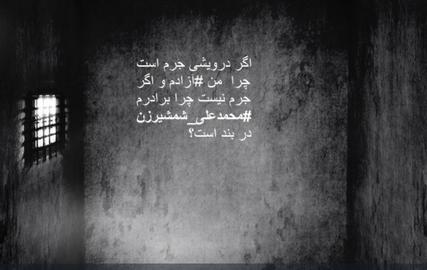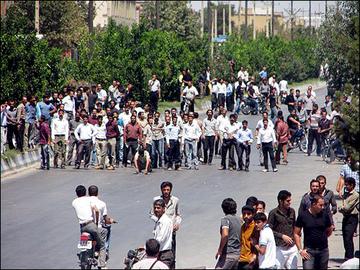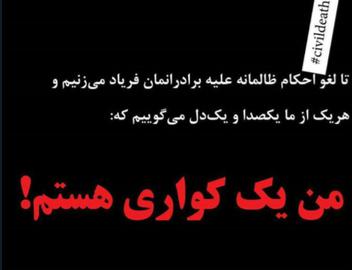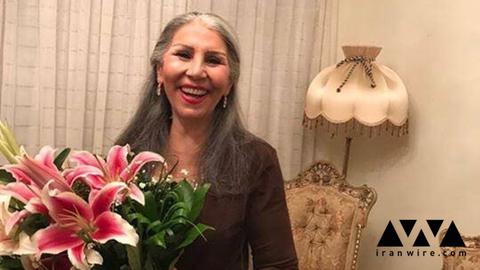A campaign launched on October 6 to protest against the crackdown on Gonabadi Sufis is gaining support, with more than 7,000 people protesting against their persecution by authorities. The No to Civil Death campaign was launched after authorities condemned Sufi dervishes Mohammad Ali Shamshirzan and Hamid Arayesh to prison for life unless they repent for their actions — a move that activists say is illegal. The two members of the Gonabadi Sufi order had initially been sentenced to permanent exile for “waging war against the state” through membership to what authorities described as “a deviant sect,” but officials recently announced that they were to be given life sentences.
Activists have signed a statement issued by the Gonabadi Sufi order which calls for an end to ill treatment, discrimination and violence. “Some parts of the judiciary,” the statement reads, “have issued unjust sentences with arbitrary detentions which... have been a source of insecurity and violence.”
The Sufis also call on the judiciary to remain independent “in accordance with the constitution” and to protect “personal and social,” as well as public, rights. The group say that although the judiciary is tasked with implementing laws, in practice, “it has had the largest share in the expansion and continuation of discrimination and the violation of the rights of the dervishes.”
No to Civil Death activists encourage people to identify with the dervishes, exposing the far-reaching impact of such persecution, as well as its arbitrary nature. People have shown solidarity with Arayeh and Shamshirzan, referring to them as “brothers” who have been illegally charged. Among the tweets and mottos being shared are “I am a Gonabadi dervish, too,” “If being a dervish is a crime then I am a dervish, too,” and “Arrest me too.” Videos marked with the hashtags “No to Civil Death” (نه_به_مرگ_شهری#) and “I am a Kavari” (من_یک_کواری_هستم# — referring to a gathering place for Gonabadi dervishes in the city of Kavar, and an attack there in 2011 — have been shared on social networks.
The campaign has been particularly popular on Instagram, and it appears to have galvanized people of all ages, all of whom have condemned the way Islamic Republic authorities have treated dervishes.
Those who started the campaign say they want to raise awareness of what they call the “civil death” going on in Iran today. People are forced to abandon their personal beliefs, it’s impossible for them to access the “legal benefits” to which they are entitled, and they are not given the right to protect their communities or improve them, they say. These obstacles, as well as “discrimination and deprivation of human and social rights,” have created conditions similar to being in exile. All of these violations and this discrimination amount to what they call “civil death.”
A History of Discrimination
The Sufis and Islamic mystic orders have been under varying levels of pressure since the 1979 Islamic Revolution. But the harassment of the dervishes took a turn for worse in September 2011, when radical Shia Muslim seminary students attacked dervishes in the city of Kavar in Fars province, a gathering place where Gonabadi dervishes hold religious ceremonies. They killed one dervish, Vahid Banaei, and injured three others. The Special Clergy Court summoned those responsible, but then Intelligence Ministry agents arrested six of the victims of the attack. They took the dervishes to the ministry’s detention center in the provincial capital city of Shiraz, where they interrogated them and later transferred them to the city’s Adel Abad Prison.
In April 2015, the Revolutionary Court in Shiraz sentenced the Sufis to long periods in exile on charges of “waging war against the state” through membership to “a deviant sect.” One of those exiled was Mohammad Ali Shamshirzan, who has now been given a life sentence. At the time, he was sent to the southern port city of Bandar Abbas.
Of the seminary students responsible for attacking dervishes, two were sentenced by the Special Clergy Court to six months in prison and 34 lashes — but both sentences were suspended. Nobody was held accountable for the death of Vahid Banaei.
As was reported by the Center for Human Rights in Iran on October 5, Shamshirzan, who has been suffering from medical problems, began his exile in Bandar Abbas in the spring of 2016, but was imprisoned on January 7, 2017 after checking in with the local police station. He has been held there ever since.
“According to doctors at the prison clinic in Bandar Abbas, Mr. Shamshirzan, who suffers from heart disease, needs urgent treatment, but the prison officials have so far refused to allow him to be seen by a specialist,” a source told the center. Shamshirzan was hospitalized twice, in January 29 and March 2, 2017, but each time he was quickly returned to prison despite the doctors’ recommendations. And, following on from the judiciary’s recent decision to change the terms of his sentence, Shamshirzan now faces a lifetime in prison unless he agrees to repent for his religious activities as a Gonabadi Sufi dervish.
The judge responsible for handing down the Shiraz Revolutionary Court verdicts argued that the sentences were changed because the punishment of exile was merely the “minimum” allowed under the law, but that the alleged crime of “waging war against the state” by following “a deviant sect” has no “ceiling” — meaning that it can be arbitrarily increased — unless they repent. Article 284 of the Islamic Republic Penal Code states that “warriors against God” must stay in exile until they repent, but in recent years Ayatollah Khamenei has issued fatwas allowing the judiciary to convert the exile verdict into prison sentences.
Article 23 of the Islamic Republic clearly states that the “investigation of individuals' beliefs is forbidden, and no one may be molested or taken to task simply for holding a certain belief.” But, as with so many minority religious groups in Iran, the reality is much different. Gonabadi dervishes and others have been under constant harassment since the Islamic Revolution of 1979. So the recent campaign, which identifies this treatment and harassment as “civil death,” is accurate, to say the least.
visit the accountability section
In this section of Iran Wire, you can contact the officials and launch your campaign for various problems



























comments